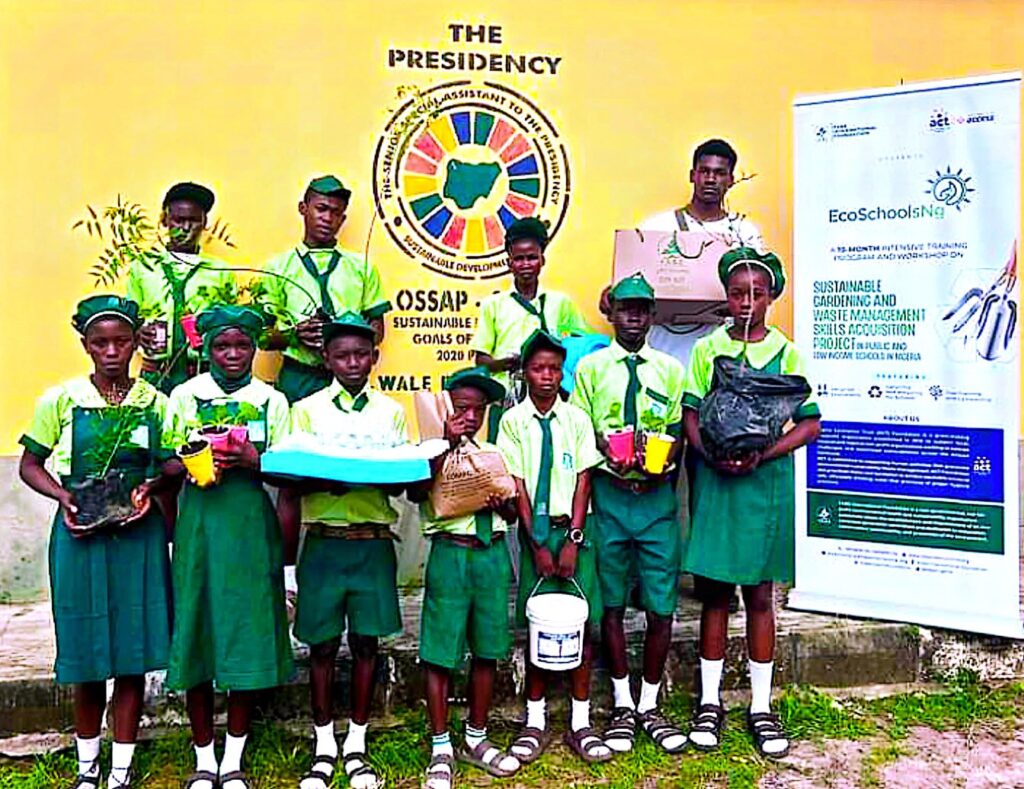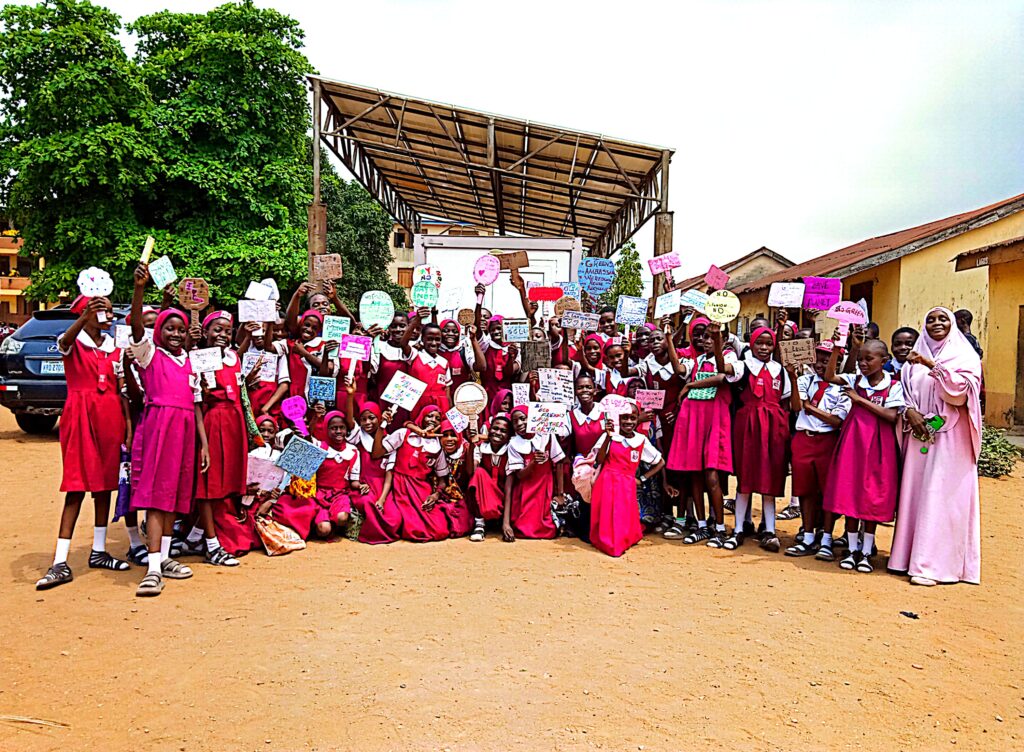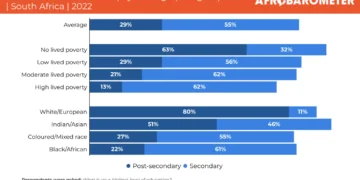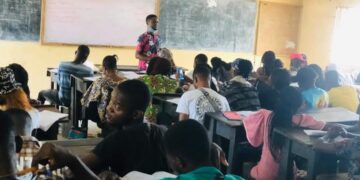 What if the solution to Nigeria’s environmental crises lies not only in policy but in the classrooms of low-income schools, where the seeds of sustainability can be sown? Amidst escalating challenges that threaten our society’s foundation, how do we ensure that the most vulnerable voices: the youth in these schools, are not just heard but empowered to lead a positive change?
What if the solution to Nigeria’s environmental crises lies not only in policy but in the classrooms of low-income schools, where the seeds of sustainability can be sown? Amidst escalating challenges that threaten our society’s foundation, how do we ensure that the most vulnerable voices: the youth in these schools, are not just heard but empowered to lead a positive change?
As environmental degradation becomes a global concern, Nigeria is at a critical moment. Disadvantaged communities face severe challenges from climate change, desertification, and flooding, threatening lives and properties. However, these crises also present an opportunity: by recognizing low-income classrooms as vital spaces for environmental education, we can empower young people to become informed leaders ready to confront the pressing environmental issues facing their communities.
Education is crucial for understanding global warming and increasing climate literacy, helping youth adapt to climate-related changes (UNESCO, 2019). Promoting environmental awareness from an early age is one of the most effective long-term solutions. Schools play a key role in nurturing young minds and can effectively teach environmental values, especially in regions most affected by environmental threats.
In Nigeria, various initiatives are working tirelessly to promote environmental education and sustainability among youth. One of them is EduCycle, which focuses on empowering students in low-income communities in Lagos State, Nigeria.
 Through school clubs, workshops, and creative storytelling, EduCycle engages students to become active participants in environmental change. The initiative teaches practical skills like recycling and climate action strategies, helping students understand their personal responsibility toward environmental sustainability.
Through school clubs, workshops, and creative storytelling, EduCycle engages students to become active participants in environmental change. The initiative teaches practical skills like recycling and climate action strategies, helping students understand their personal responsibility toward environmental sustainability.
Another notable organisation is the FABE International Foundation, which operates the EcoSchoolsNg initiative. This program targets low-income schools in Nigeria, with the goal of inspiring 1,000 institutions to adopt sustainable practices by 2030.
By enhancing curricula and offering hands-on workshops like the Upcycling Club, the foundation educates students on waste management and organic gardening. This approach improves the school environment and builds Eco-Ambassadors who address climate change in their communities.
The NerdzFactory Foundation promotes sustainability education by establishing clubs in secondary schools across Lagos State, Nigeria. These clubs offer workshops and activities that encourage students to engage with climate change and environmental conservation.
Additionally, the foundation leads a tree planting campaign in collaboration with schools, creating green spaces that improve air quality and overall well-being.
These initiatives emphasize the importance of environmental education among young people, equipping them with the skills and knowledge to actively contribute to a sustainable future for their communities and the planet.

Challenges of Teaching Environmental Education in Low-Income Schools
Despite the urgent need for environmental education, several significant challenges hinder its effective implementation in low-income schools. Some of them include;
Inadequate Teacher Training: Many educators lack proper training in environmental education and sustainability concepts, leading to low environmental literacy and ineffective teaching practices (Morote, Hernández & Olcina, 2021; Amanchukwu et al., 2015). In underserved schools, this gap is pronounced, as teachers may not be well-informed about critical issues like climate change, resource conservation, and sustainable practices. This lack of knowledge hampers their ability to engage students meaningfully on these important topics.
Limited Curriculum Inclusion: Climate change education is often not integrated into formal school curricula, restricting student engagement and resulting in a fragmented understanding of the topic (Stevenson, Nicholls & Whitehouse, 2017; Lehtonen, Salonen & Cantell, 2019). This exclusion means that students miss out on critical knowledge that could empower them to address environmental challenges in their communities.
Resource Shortages: Low-income schools frequently face shortages of educational materials and rely on outdated resources, making it challenging to teach climate change concepts effectively (Pruneau, 2010; Norgaard, 2011). There is often little or no access to digital learning resources, such as online platforms or interactive tools that could enhance students’ understanding of environmental sustainability. This lack of technology not only limits teaching methods but also restricts students’ ability to engage with current environmental issues.
Insufficient Community Awareness: A lack of understanding about climate change within the community undermines the effectiveness of educational initiatives and limits their overall impact (Ardoin et al., 2009). In disadvantaged areas, community members may not see the relevance of climate education to their daily lives, further diminishing support for school programs focused on environmental issues.
Recommendations for Addressing Environmental Education Challenges in Low-Income Schools
Tackling these challenges requires strategic solutions that can enhance environmental education in underserved areas. These include;
Targeted Teacher Training: Developing training programs specifically for educators in rural areas is vital. These programs should focus on local environmental issues, such as sustainable agriculture and water management. Involving local experts will ensure teachers acquire relevant knowledge and skills, enabling them to effectively teach these important topics.
Extracurricular Environmental Activities: Establishing extracurricular programs, such as green clubs, allows students to engage in hands-on learning outside the classroom. These activities help students connect with their environment and apply sustainability concepts in real-life situations, thereby enhancing their understanding and appreciation of ecological issues.
Utilizing Local Resources and Partnerships: Schools can enhance their environmental education by using available local resources like parks and farms for practical lessons. Collaborating with NGOs can also provide additional support, including educational materials and funding, which can strengthen local environmental initiatives and enrich the curriculum.
Community Engagement Initiatives: Organizing community events, such as tree planting and clean-up days, raises awareness about climate change and sustainability. Involving families and local leaders promotes a sense of ownership and commitment to environmental issues, thereby increasing community support for school programs focused on these concepts.
Conclusion
Nigeria’s environmental future is in the hands of its youth, and the time to act is now. By prioritizing environmental education in low-income schools, we can empower a force of change-makers ready to tackle climate challenges. Equipping young people in disadvantaged communities with sustainable leadership skills ensures that no one is left behind and that everyone, regardless of their background, can play a crucial role in addressing pressing environmental issues. Through our collective efforts, we can build a sustainable world.
________________ Taiwo Alabi is a passionate environmental advocate and educator, dedicated to empowering the next generation to protect the planet. As a first-class graduate of the University of Lagos and Education Officer at the Lagos State Teaching Service Commission, she drives positive change through environmental education and community engagement. Through her innovative initiative, EduCycle, Taiwo has made significant strides in promoting environmental sustainability, enhancing literacy, and fostering community development in underserved communities. Her tireless efforts have earned her numerous awards, including: Winner, 2023 Excellent Teachers' Award (Agape Life Project and Coachfrika) 1st Runner Up, 2023 IDEE Teachers Prize (Initiative for Development and Education) Most Impactful Educator Award (Teachers' Reform Academy) Woman of the Month recognition (Girls' Gate Initiative) Best Teacher of the Year Award (Ikorodu Junior Grammar School) Grant recipient, The Pollination Project Taiwo remains committed to inspiring environmental stewardship and transforming education in Nigeria. Her work at EduCycle continues to inspire positive transformation, empowering communities to protect the environment for generations to come. Contact: +2348081300710 Social Media Handles: LinkedIn Facebook


































































 EduTimes Africa, a product of Education Times Africa, is a magazine publication that aims to lend its support to close the yawning gap in Africa's educational development.
EduTimes Africa, a product of Education Times Africa, is a magazine publication that aims to lend its support to close the yawning gap in Africa's educational development.

